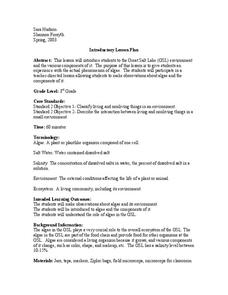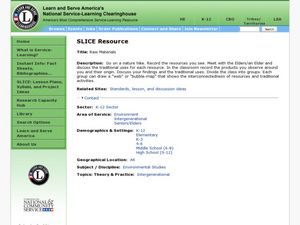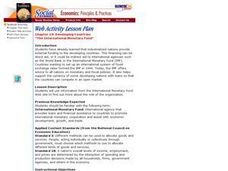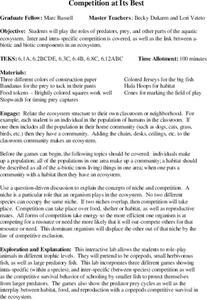Curated OER
Classification: Dichotomous Key
Learners explain the classification process of organisms. In this biology lesson, students practice writing the names of organisms scientifically. They answer the dichotomous key and discuss answers as a class.
Curated OER
Great Salt Lake
Third graders are introduced to the Great Salt Lake (GSL) environment and the various components of it. They make observations about algae and its environment and discuss why it is considered a living organism and various components of...
Curated OER
Hierarchical Structure
Students practice using the request, response, result method to solve problems. Using one problem as an example, they break it down into multiple problems to be solved one at a time. They identify instances of hierarchical organization...
Curated OER
History of Philanthropy
Students identify events and organizations that involve philanthropy. They research one event and share their information with the school. They write journal entries stating ideas from the presentations.
Curated OER
Creatures of the Ocean
Second graders examine the characteristics of a specific ocean creature. In pairs, 2nd graders create a graphic organizer to list categories and supporting details of the ocean creature. Students review data and use it to write a report...
Curated OER
Using the Internet to Learn About Marine Life in our Area
Young scholars explore how living things interact with their environment. They research marine life that is studied by Mote Marine Laboratory. Students track sick and injured marine animals. They explore the red tide and the geography of...
Curated OER
What Do We Have In Common?
Seventh graders perform a dissection on a mussels and label their internal organs. In groups, they compare and contrast the mussels structure to those of human beings. They also review the functions that are necessary for survival and...
Curated OER
Who Has the Greatest Voice?
High schoolers identify the impact that interest groups, scientists, government health organizations and legislators have on health issues in the United States. They explain the role of the committee hearing in the lawmaking process....
Curated OER
Brine Shrimp Life Cycle
Second graders investigate the life cycle of the brine shrimp. They use a variety of resources to find the details of each step. Students compare the life cycles of different organisms. They create diagrams of the different stages while...
Curated OER
Our Environment
Students engage in a literature study that helps students to connect with some of the issues of conservation. They list parts of the environment that need protection with the help of a graphic organizer. Then students discuss in groups...
Curated OER
Tree of Giving
Students work together as a team to solve the hypothetical common problem of litter. They give examples of organizations that focus on trying to help others in significant ways (volunteers). Each group maps out their strategy, a tree...
Curated OER
Raw Materials
Students participate in a nature hike and record the natural resources observed. They compare traditional and modern versions of everyday use items, and create graphic organizers that demonstrate the interconnectedness of resources.
Curated OER
Understanding the Layers of the Earth
Fourth graders explore the three layers of the Earth describing the composition, thickness, and temperature of each layer. Layers are compared and contrasted and data unearthed placed into graphic organizers.
Curated OER
Developing Countries - International Monetary Fund
Students access the International Monetary Fund website and explore it in order to research the role of the organization. They use their findings to describe the purpose and activities of the International Monetary Fund.
Curated OER
Compettion at its Best
Sixth graders role play predators, prey and other parts of the aquatic ecosystem. They show inter and intra-specific competition as well as the link between abiotic and biotic components in an ecosystem. Students play games about the...
Curated OER
Take a Stand-On Solid Ground
Fifth graders conduct research and communicate an opinion on a public policy issue. They are required to present the issue, evaluate possible postions, and gather and organize information to support their opinion.
Curated OER
Five Senses-Introduction
Students explore the parts of the body that are used to develop the five senses. They conduct a nature walk. Students identify the things they see, hear, smell, and touch. They create a graphic organizer to organize their answers.
Curated OER
Evolution, Genes, and Behavior
Students examine the roles of genes and evolution on behaviors. In groups, they identify the relationships among DNA, genes and chromosomes. They evaluate the different theories of language acquistion and how evolved tendencies interact...
Curated OER
Minorities in a Cross-Cultural Perspective Debate Simulation Case Study: China's Borderlands
Twelfth graders investigate if minority status is synonymous with powerlessness in China. They examine if minority and majority groups interact with equity and justice in China. Students present their findings in a debate-simulation format.
Curated OER
Which Wrap Is Wrapped Right?
Young scholars investigate the integrity and strength of different types of food wraps. They test the wraps and create a graphic organizer for the data. Once it is organized then a lab report can be written. The lesson plan contains...
Curated OER
Effects of The Great Depression
Seventh graders discuss the unemployment trends of the 1920s-1930's. They look at it faces of the citizens that lived in the time period. Students work with visual clues to investigate about the living conditions during the Great...
Curated OER
Salmon Smolt: Stella PC and Mac
Students investigate the Stella Smolts Migration Model and its use in previous simulation models to help managers deal with the many factors contributing smolts decline. They participate in an interactive exercise in the role of fishery...
Curated OER
Whose Land Is It Anyway?
Seventh graders comprehend the interaction and conflict beween Native Americans and white settlers in the years following the Civil War. They listen to T"his Land is Your Land." Students are asked what their interpretation of the...
Curated OER
Geography Made Fun with Technology
Young scholars incorporate knowledge box into their classroom activities. In this technology integration lesson, students fill out a graphic organizer using Glossopedia to analyze a new subject.
Other popular searches
- How Organisms Interact
- How Do Organisms Interact
- Interactions Among Organisms
- Interactions Between Organisms
- Interaction Among Organisms
- Interaction of Organisms

























